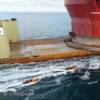Costa Cruises Receives ABB Award
Costa Cruises has received the ABB Energy Efficiency Award 2009 in recognition of its efforts and progress in improving energy efficiency in its motor and drive systems.
The prize was presented as part of “Energy Efficiency Award 2009. Designing and achieving energy efficiency: new conversations”, an event promoted and arranged by Abb Sace, a division of ABB Spa, and hosted by Mario Tozzi, an outstanding Italian science divulger. In addition to Costa Cruises’ project, the initiatives implemented by the other two prize-winning Italian enterprises – Fiat Auto and Fiorucci, leaders in the vehicle manufacturing and food industries, respectively – were also illustrated at the ceremony.
Costa Cruises qualified for the award by installing inverters on its ships: these devices are designed to control the supply of electrical power and find the point of peak efficiency, thereby ensuring the flexibility of systems and machinery in relation to effective operational demands. The use of these variable speed drives has optimized the performance of fans and blowers in the engine room and led to substantial energy saving combined with reduced environmental impact.
Intelligent inverter speed control was first introduced on the Costa Fortuna and Costa Serena, while work is already scheduled to install similar devices on the Costa Magica, Costa Pacifica and Costa Concordia. Meanwhile, the Costa Luminosa, which joined the fleet in May this year, and the 15th fleet member Costa Deliziosa, due for delivery in January 2010, have both been designed with inverters already fitted on board.
Thanks to 51 inverters installed in all on the Costa Fortuna (102,600 gross tonnage and 3470 total Guests) and on the Costa Serena (114,500 gross tonnage and total Guest capacity of 3780), about 8,760,000 kWh, corresponding to approximately 1,820 tons of bunker, were saved in 12 months, with a significant decrease in air emissions, namely 5,723 t/year of CO2.
Costa Cruises’ commitment to the implementation of energy saving systems, with fleetwide application in a range of areas, is in line with the Group’s environmental policy, which specifies obligations and targets that are far more restrictive than those laid down by mandatory international rules and requirements.
A separate collection program is in operation on all 14 ships in the Costa fleet for all of the solid waste generated. No solid waste (except for food waste) or special waste is ever discharged overboard. About 400 m3 of aluminum and 2100 m3 of glass from the ships are sent for recycling each year. Most of the water used is produced directly on board using desalination plants and the ships are fitted with double bilge (oily water) separators as well as the fail-safe “white box” system enabling a further check of the oil content of effluent water. In addition, Costa carries out systematic sampling and analysis of engine, diesel generator and incinerator emissions, as well as monitoring of electromagnetic emission levels.
The Costa Luminosa, which entered service in May this year, is the first ship in Italy and one of the first in the world to be equipped for “cold ironing”, namely a system whereby vessels are plugged into shoreside electrical power, enabling generators to be shut down during stopovers in port. This means the environmental impact of port calls is also greatly reduced. The Costa Deliziosa, due for delivery in January 2010, will be fitted with the same system.
Costa Cruises is the only cruise company to have its own environmental management system developed in accordance with the latest international standards (UNI EN ISO 14001, issued in 2004) and documented in a Sustainability Report drawn up in accordance with the Guidelines of the Global Reporting Initiative (GRI) and certified by RINA (the Italian Shipping Register). Moreover, in 2005 Costa Cruises became the first company in the world to receive the “Green Star” across the fleet from RINA; this prestigious notation certifies that all Costa’s vessels comply with environmental standards for the prevention of pollution of the marine environment and it is actually stricter than the prevailing provisions of the international MARPOL Convention. Further confirmation of the Company’s commitment to environmental conservation comes in the form of the partnership established in 2005 with WWF Italia to protect the marine environment, dedicated this year to a project safeguarding the Mediterranean Sea.














